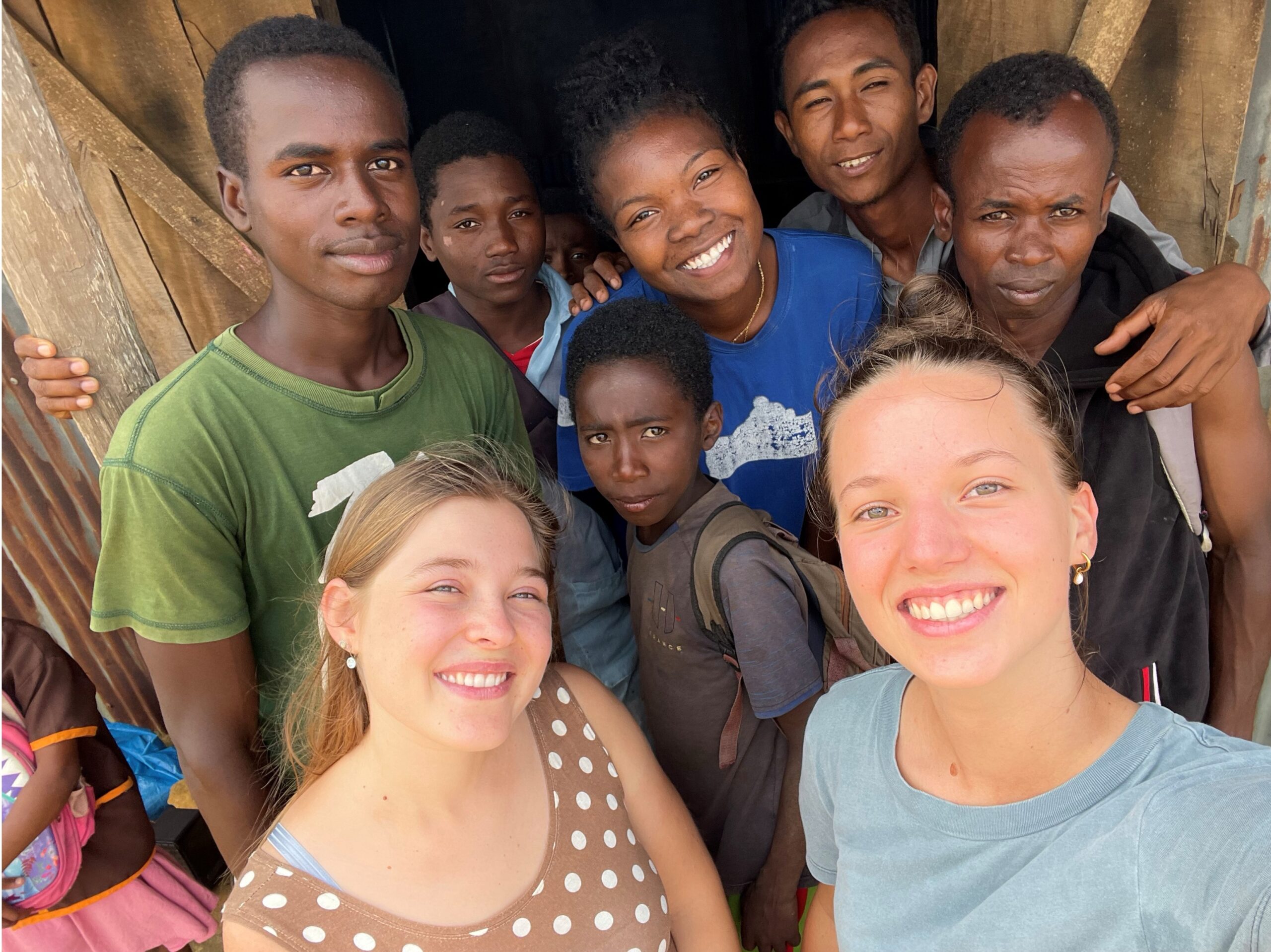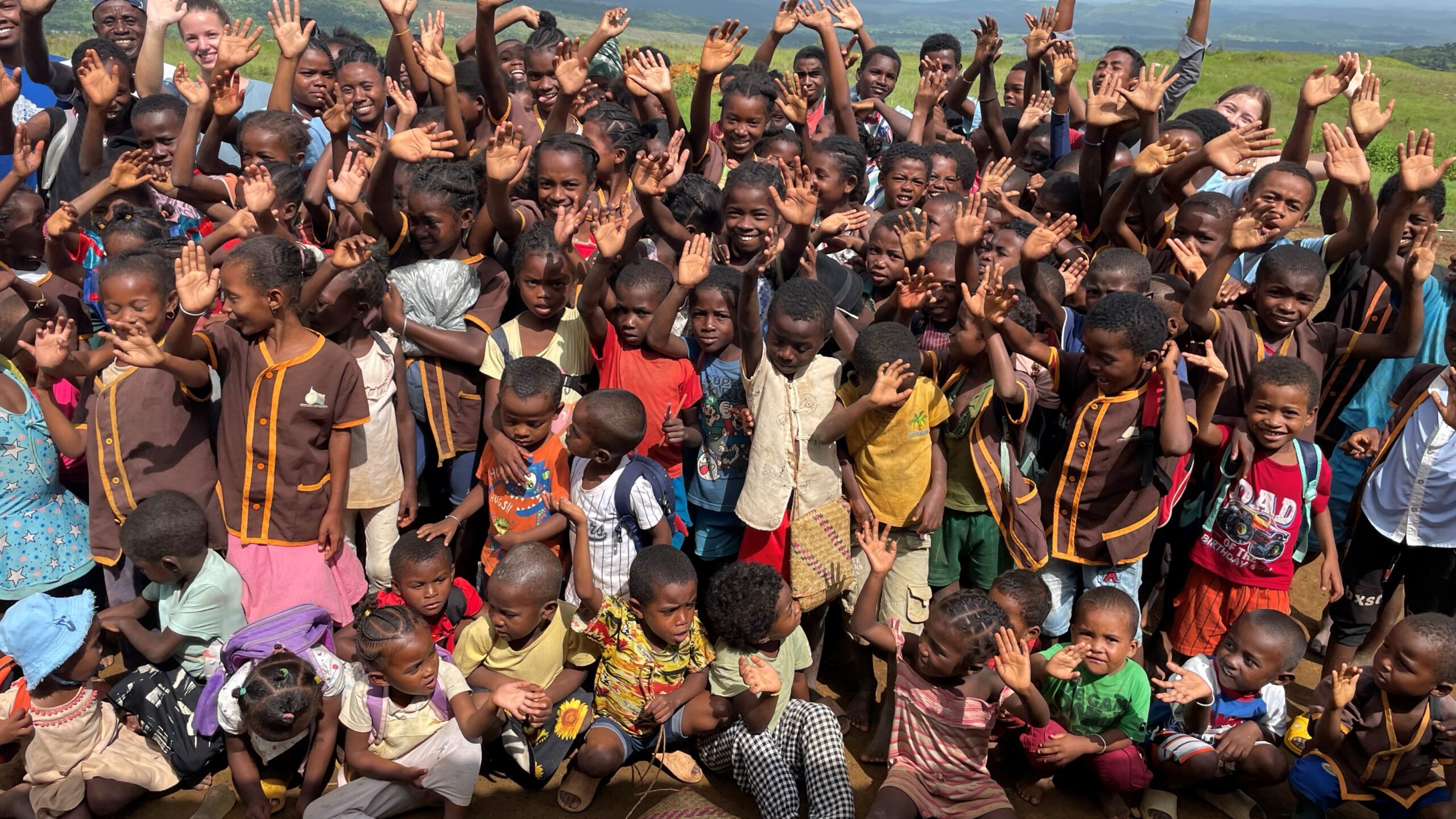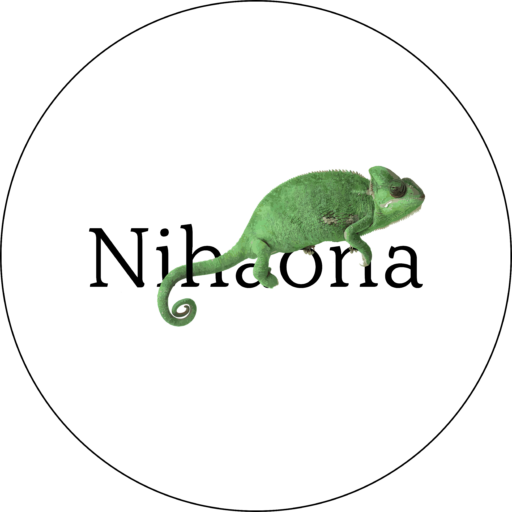Experience reports
Volunteering: School 2025
In January, February and March 2025, Ena and Mea from eastern Switzerland volunteered at the MadaClinics school in Maventibao through Verein Nihaona. A valuable experience, as they both say. In Maventibao, they taught children of all ages and later provided guidance and further training to the local teachers.
They found the Nihaona association by chance. After that, they got in touch with the president of the association, Florentin. He had already completed several volunteer placements in Maventibao himself. This enabled them to organize their trip together with Florentin and made it easier for them to get in touch with the local people. For example, it was possible to organize for them to be picked up on Nosy Be as soon as they arrived in Madagascar and they didn’t have to make their way to Maventibao alone.
Ena and Mea report that their daily routine was very much geared towards meal times and school lessons. Breakfast was served at around 8 a.m. (Madagascar has a time difference of around one hour to Switzerland) and school started at half past eight. This lasted until 12 noon and then from 2 pm to 6 pm. Dinner was served at 8 pm. “I would go again just for Estelle’s cooking skills,” says Ena. Estelle is the chef at MadaClinics and cooks for the team on site. Ena and Mea had the feeling of being fully integrated into people’s everyday lives. A wonderful feeling, they say.
At the same time, they also learned how different everyday school life is in Maventibao compared to Switzerland. For example, the school is heavily dependent on the weather. If the weather is bad, many children – some of whom have to walk up to five kilometers to school – tend not to come to school. School materials are also a challenge. There are too few, which is why the children are sometimes not allowed to write in their exercise books.
Despite, or perhaps because of, the major differences to Switzerland, the two would recommend the voluntary service in Maventibao to people who are completing initial or further pedagogical training. You can see directly what kind of impact you can create and the two of them have learned a lot. You can find out more about Madagascar and their trip, which they combined with the volunteer placement, in their experience report.

Many roads lead to Rome, but only one special one to Maventibao - an experience report from the volunteer programme
Between 2 January and 12 March, we were on Malagasy soil and experienced a quiet and exciting time. We spent eight weeks on site in Maventibao, during which we assisted in the clinic and spent most of the time at the local school.
Our main conclusion: many roads lead to Rome, and in many different ways. It starts with the feeling of happiness. Coming from Switzerland and thus from a stable economy, happiness is often equated with prosperity. In Maventibao, we realised once again that financial means contribute to this, but are not necessary. With the right people and a solid livelihood, you can also be filled with happiness. The ONG MadaClinics and Nihaona make a fundamental contribution to ensuring that a healthcare and education system is in place and that people have this basis for life.
We also experienced new ways of coping with everyday life. Scrubbing the laundry at the water source and socialising with the local women was a completely new experience for us. This has an impact on our current washing behaviour. Cleanliness must always be put into perspective. What we initially perceived as dirty and unhygienic changed over time. The floor, which we initially avoided, became a daily ‘siesta spot’ and the ‘toothpaste-spattered’ floor also washed out with the rain. We had similar feelings about the kitchen. We probably ate a few more ants than usual. However, we were also treated to fresh baguettes, omelettes, ‘tarte de coco’ and chocolate cream. Rice was usually part of the meal, but Estelle made sure there was plenty of variety.
The whole life took place in nature. Always breathing in the fresh air was a great gift. We got used to the ‘open house’ for all the animals and insects. Fortunately, there was a mosquito net, so at least the night was quiet. Nature is utilised holistically. The banana is eaten, the trunk is used for the walls and the leaves are used for the roof of the house. The force of nature takes on a different meaning. You are at its mercy, the day is adapted to the weather and not the other way round. The rainy season didn’t limit us as we had initially feared, but rather trained us in adaptability, patience and flexibility. These were skills that we were able to develop in particular.
We have experienced cultural influences in two areas in particular. On the one hand in the practice of our own religions and on the other in the use of mobile phones. We perceived the various communities as peaceful and always felt at ease. On the other hand, we were surprised by the presence of mobile phones in daily use. It was one of their luxury goods and every call was therefore a priority. If Dad called during the consultation, the patient was kept waiting and messages were also sent to ‘the love of my life’ during lessons.
Rich and poor are also omnipresent in Madagascar, but the disparities are immense. The distribution is the opposite of Switzerland. The majority live at subsistence level and only a small proportion can afford anything extra. For example, not everyone can buy a new sun hat for the equivalent of 2 euros. Seeing this moved us deeply. Over time, we found our role in the village and were seen as part of the community. In contrast, on our two-week trip through the east of Madagascar, we unintentionally found ourselves in ‘rich tourist status’. Conversations at eye level were no longer possible. For an all-encompassing understanding of a culture, we subsequently found it necessary to experience both sides.
Many roads lead to lessons. In two further training courses for primary and secondary school teachers, we tried to pass on our ‘roads to Rome’ in order to enable them to organise more methodologically and didactically well-founded lessons.
A small but noteworthy bonus: A lemur is extremely fluffy (there is one in the ‘reptiles parc’ near Andasibe).
Samy tsara!
Mea & Ena

Experience Reports Clinic
Report will follow


